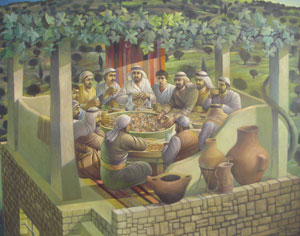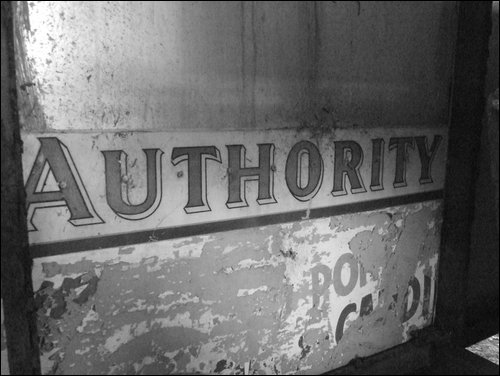|
SABBATH SERIES #1
2. Is the First Day of the Week Holy?

The word 'Sunday' does not, of course, appear in any place in the Bible, and neither for that matter does the word 'Saturday'. However the phrases "first day" and "seventh day" most definitely do, and so it is to these designations we will continue to limit our study for now.
The phrase "first day of the week" occurs in exactly eight places in the New Testament so it will not take long to examine these texts to see if they make any reference to a sabbath or a special day of worship for Christians.
If the day was changed by Bible authority - indeed, if Christians are to find any Bible authority whatsoever for observing the "first day" as the "Lord's Day" today - then we must find that authority in at least one of these eight texts.
Let us acknowledge at the outset, since the seventh day of the week is clearly established as the Bible Sabbath up until the time of the crucifixion, that there can be no Bible authority for first day of the week observance unless we find it clearly and plainly stated in one of these eight New Testament passages.
So let us examine them carefully, honestly, and prayerfully.
A. The Day After The Sabbath
- 1. MATTHEW 28:1 "Now after the Sabbath, toward the dawn of the first day of the week, Mary Magdalene and the other Mary went to see the sepulchre" (RSV).
 This is the first place in the Bible where "the first day of the week" is mentioned. Matthew wrote these words, under the inspiration of the Ruach haQodesh (Holy Spirit), six years after the New Testament Messianic Community (Church) came into being. The text says that after the Sabbath day it was drawing toward (Greek, 'into') the first day of the week. So this scripture, we must admit, tells us plainly that on the third day after all that was done away had been securely "nailed to the cross" (Col.2:14), the Sabbath was still the day before the first day of the week - still the seventh day of the week.
This is the first place in the Bible where "the first day of the week" is mentioned. Matthew wrote these words, under the inspiration of the Ruach haQodesh (Holy Spirit), six years after the New Testament Messianic Community (Church) came into being. The text says that after the Sabbath day it was drawing toward (Greek, 'into') the first day of the week. So this scripture, we must admit, tells us plainly that on the third day after all that was done away had been securely "nailed to the cross" (Col.2:14), the Sabbath was still the day before the first day of the week - still the seventh day of the week.
One point is here plainly proved. Many tell us (and indeed we reasoned this ourselves at one time) that the Sabbath command was merely for "one day in seven" - that it did not have to be the seventh day of the week, but merely the seventh part of time. They argue that Sunday, being one day out of seven, fulfils the command. But here is a passage in the New Testament, inspired by the Ruach haQodesh (Holy Spirit) six years after the beginning of the New Testament Community (Church), stating in plain language that, on the third day after all abolished things had been done away with, the Sabbath still existed and that it was the seventh day of the week - the day before the First Day of the Week. That much is proved, and must remain settled for all who honestly seek and accept Bible authority. But, was the day changed later?
- 2. MARK 16:2 "And very early on the first day of the week they went to the tomb when the sun had risen" (RSV).
This is merely Mark's version of the sunrise visit to the tomb. It was written ten years after the crucifixion. This first day of the week, also, was "when the Sabbath was past", according to verse 1. So this text proves the same thing as the one above - that the first day of the week was not at that time (three days after the crucifixion) the Sabbath, but the day after the Sabbath. The Sabbath, then, was still the seventh day of the week.
B. A Common Work Day
- 3. MARK 16:9 "Now when He rose early on the first day of the week, Yah'shua (Jesus) went first to Mary Magdalene, from whom He had cast out seven demons" (RSV).
This text speaks of Yah'shua's (Jesus') appearance to Mary Magdalene later the same day - the day after the Sabbath.
 Nothing here calls the first day of the week the Christian Sabbath, we must admit. Nothing here calls it "The Lord's Day". Nothing here hallows Sunday or says Elohim (God) made it holy. Nothing here commands us to observe it. Nothing here sets it apart as a memorial of the resurrection, or for any purpose. No command or example of rest on this day - no authority for observing the first day here.
Nothing here calls the first day of the week the Christian Sabbath, we must admit. Nothing here calls it "The Lord's Day". Nothing here hallows Sunday or says Elohim (God) made it holy. Nothing here commands us to observe it. Nothing here sets it apart as a memorial of the resurrection, or for any purpose. No command or example of rest on this day - no authority for observing the first day here.
- 4. LUKE 24:1 "But upon the first day of the week, at early dawn, they went to the tomb, taking the spices which they had prepared, and certain others with them" (RSV).
This text tells again the same event recorded by Matthew and Mark, and it shows that on the first day of the week these women came to do the work of a common weekday, after having rested on the Sabbath day "according to the commandment". For we read, in the verse just before this, "On the Sabbath they rested according to the commandment" (Luke 23:56b). Shall we say these women did not yet know the commandment was abolished? No, we cannot, for this statement was not made by the women, but inspired by the Ruach haQodesh (Holy Spirit), who did know it was not abolished. And it was written approximately thirty years after the establishing of the New Testament Community (Church)! The Ruach haQodesh (Holy Spirit) then inspired the direct statement that the "rest" of these women on the Sabbath day was according to the commandment, which statement would not be possible had the commandment been abolished.
This text, then, establishes the first day as a common week day, on the third day after the crucifixion, and it further establishes that at that time the command to rest on the Sabbath had not been abolished.
- 5. JOHN 20:1 "Now on the first day of the week Mary Magdalene came to the tomb early, while it was still dark, and saw that the stone had been taken away from the tomb" (RSV).
This, written sixty-three years after the crucifixion, is merely John's version, describing the same visit to the tomb. It confirms the facts above.
C. Was This a Religious Meeting to Celebrate the Resurrection?
- 6. JOHN 20:19 "On the evening of that day, the first day of the week, the doors being shut where the disciples were, for fear of the Jews, Yah'shua (Jesus) came among them and said to them, 'Peace be with you'" (RSV).
Let us examine this carefully, for some claim this was a religious service called for the purpose of celebrating the resurrection. But notice that this is the same first day of the week that followed the Sabbath. It was Yah'shua's (Jesus') first opportunity to appear to His disciples. For three-and-a-half years He had been constantly with them, on all days of the week. His meeting with them, of itself, could not establish any day as the Sabbath.
Were they assembled to celebrate the resurrection, thus establishing the first day of the week as the Christian Sabbath in honour of the resurrection? The text says they were assembled "for fear of the Jews". The Judeans had just taken and crucified their Master. They were afraid. The doors were shut because of their fear - probably bolted. Why were they assembled? "For fear of the Jews," according to this text, and also because they all lived together in the upper room (Acts 1:13). They could not have assembled to celebrate the resurrection, for they did not believe Yah'shua (Jesus) was risen! (Mark 16:14; Luke 24:37,39,41) Nothing in this text calls this day "Sabbath", or "Lord's Day", or any sacred title. Nothing here sets it apart, makes it holy or qodesh. No authority here for changing a command of Yahweh!
D. Lord's Supper Day - or Work Day - Which?
- 7. ACTS 20:7-8 "On the first day of the week, when we were gathered together to break bread, Paul talked with them, intending to depart on the morrow; and he prolonged his speech until midnight. There were many lights in the upper chamber where we were gathered" (RSV).
Here, at last, we find a religious meeting on the first day of the week. But was it a 'holy day' or just an evangelistic meeting on the evening an ordinary week day? Holy Day meetings tend to take place in the day time, because everyone has the day off, and often in the mornings. When people meet on ordinary week- or working-days, they tend to meet in the evenings during their time-off, don't they?
Notice, Paul continued his speech until midnight! "There were many lights in the upper chamber where we were gathered." It was after sunset, prior to midnight and prior to sunrise, the first day of the week. Sounds like a working day, doesn't it, otherwise why meet in the evening?
At this juncture we have to pause to explain that the biblical Hebrews observed days from sunrise to sunrise and not from sunset to sunset as modern Jews and Messianics do, or from midnight to midnight as we do in the West and throughout the world today based on Roman customs. For a full biblical exegesis of this truth, please see Day's Beginning: Sunset, Midnight or Sunrise?, Day's Beginning: The Testimony of Manna-Gathering and Day's Beginning: Nehemiah & the Wicked Masortes, though it does not affect the line of argument in this particular series.
What "Break Bread" Means
But does this text not say, as many claim today, that the disciples always held communion every first day of the week? Not at all!
In the first place, it says nothing about anything being done every first day of the week. It relates the events of this one particular first day of the week, only, on a particular evangelism campaign. It is not speaking of any customs, but of events occuring as Paul and his companions concluded their seven-day visit in passing this town.
Yah'shua (Jesus) introduced the "Lord's Supper" as an addition to the Passover, at the beginning of the annual "days of unleavened bread". No longer need they kill lambs or eat the roasted body of Passover lambs, after Christ, our Passover, had been once slain for us. Yet the Passover was ordained forever (Exodus 12:24). At His last Passover supper Yah'shua (Jesus) substituted the wine as the emblem of His blood, instead of the blood of the slain lamb. He substituted the unleavened bread for the roast body of the lamb as the symbol of His body, broken for us. The disciples continued to observe Passover annually, with "the Lord's Supper" as a more regular memorial (1 Cor.11:24) of Christ's death (1 Cor.11:26), showing His death till He comes again. They continued to observe the days of Unleavened Bread (Acts 20:6).
That particular year they had already observed Passover (Pesach), the days of Unleavened Bread (Chag haMatzah) and the 'communion' service at Philippi, after which they came to Troas in five days, where they remained seven days. After the Sabbath, the next day in the evening, "on the first day of the week... the disciples came together to break bread" (KJV).
People have assumed this expression to mean the taking of 'Communion' or the 'Eucharist'. But notice! Paul preached, and continued preaching until midnight. They had no opportunity to stop and "break bread" until then. When Paul "had gone up" - after restoring the one who had fallen down from the third balcony - "and had broken bread and eaten" (v.11, RSV).
Note it well! "Broken bread AND EATEN". This breaking bread was not 'Communion' - it was simply eating a meal. This expression was commonly used of old to designate a meal. It still is used in that sense in parts even of the United States today.
Notice Luke 22:16, where Yah'shua (Jesus) was introducing the Lord's Supper, taking it with His disciples. He said, "I will not anymore eat thereof, until it be fulfilled in the kingdom of God" (KJV). Yet, the day after His resurrection, after walking with the two disciples to Emmaus, "When He was at table with them, He took the bread and blessed, and broke it, and gave it to them" (Luke 24:30, RSV). Here Yah'shua (Jesus) "broke bread" but it was not the Lord's Supper, which He said He would not take again. It was a meal - "He was at table".
Notice Acts 2:46. The disciples, "day by day, attending the temple together and breaking bread in their homes, they partook of food with glad and generous hearts" (RSV). Here again "breaking bread" means eating a meal - not on the first day of the week, but daily.
Again, when Paul was shipwrecked on the voyage to Rome, the sailors had been fasting out of fright. But "Paul urged them all to take some food, saying, 'Today is the fourteenth day that you have continued in suspense and without food, having taken nothing. Therefore I urge you to take some food; it will give you strength...' And when he had said this, he took bread, and giving thanks to God in the presence of all he broke it and began to eat" (Acts 27:33-35, RSV). Here Paul broke bread to give to unconverted sailors who were hungry.

The truth is, NOWHERE IN THE BIBLE is the expression "breaking of bread", or "to break bread", used to signify observance of "the Lord's Supper". In all these texts it means, simply, eating a meal. So, when we read in Acts 20:7,11, "when we were gathered together to break bread", and how Paul had "broken bread and EATEN", we know by Scripture interpretation it referred only to eating food at a meal, not to a Communion service.
E. What Was This Collection?
We come now to the eighth and last place where the term "first day of the week" occurs in the Bible.
8. 1 CORINTHIANS 16:2 "On the first day of every week, each of you is to put something aside and store it up, as he may prosper" (RSV).
 Often we see this text printed on the little offering envelopes in the pews of popular churches, and we have been told that this text sets the first day of the week as the time for taking up the church collection for the carrying on of God's work, paying the minister, etc..
Often we see this text printed on the little offering envelopes in the pews of popular churches, and we have been told that this text sets the first day of the week as the time for taking up the church collection for the carrying on of God's work, paying the minister, etc..
Let us begin with the first verse and really catch the true intended meaning of this verse.
"Now concerning the contribution for the saints (believers): as I directed the assemblies (churches) in Galatia, so you are also to do. On the first day of every week, each of you is to put something aside and store it up, as he may prosper, so that contributions need not be made when I come" (1 Cor.16:1-2, RSV).
The passage speaks of a collection - but for whom - for what? Note it! Not for the preacher - not for evangelism - but "the contribution (collection) for the saints (believers)." The poor believers at Jerusalem were suffering from drought and famine. They needed, not money, but food. Notice Paul had given similar instructions to other congregations. Now observe his instruction to the Romans:
"At present, however, I am going to Jerusalem with aid for the saints (believers). For Macedonia and Achaia have been pleased to make some contribution for the poor among the saints at Jerusalem; they were pleased to do it, and indeed they are in debt to them, for if the Gentiles have come to share in their spiritual blessings, they ought also to be of service to them in material blessings. When therefore I have completed this, and have delivered to them what has been raised (lit. "sealed to them this fruit"), I shall go on by way of you to Spain" (Rom.15:25-28, RSV).
Ah! Did you catch it? It was not money, but fruit that was being sealed for shipment for the poor beliebers at Jerusalem! (The Greek word can also refer to grain, wine and other produce which can be stored for a long time without spoiling).
Now turn back to 1 Corinthians 16. Paul is speaking concerning a collection for the saints (believers). Upon the first day of the week each one of them is instructed to do what? Look at it! Does it say drop a coin in the collection plate at a church service? Not at all! It says, "each of you is to put something aside and store it up" (v.2a, RSV). Note it! Store up! Store up by himself - at home! Not store up at the church house, but something aside at home.

Now why? - "so that contributions need not be made when I come" (v.2b, RSV). Or as the KJV better puts it, "that there be no gatherings when I come". Men gather fruit out of the orchard - they gather vegetables out of the ground, to be stored up. But putting coins in a collection plate at church, or handing in your tithe envelope could not be called a gathering, but an offering or a collection.
Notice further: "And when I arrive, I will send out those whom you accredit by letter to carry your gift to Jerusalem. If it seems advisable that I should go also, they will accompany me" (vv.3-4, RSV).
Apparently it was going to require several men to carry this collection, gathered and stored up, to Jerusalem. If it were a tithe or offering for the minister or the spread of the Gospel, Paul could have carried the money alone.
So, once again, the last and final text in the Bible where we find "the first day of the week" mentioned, it is a work day - a day for gathering fruit and food out of the orchards and the fields and gardens, and storing it up. It was to be the first labour of the week, hence the first day of the week, as soon as the Sabbath was past!
No Bible Authority
So, finally, upon honest examination that not one of the texts speaking about "the first day of the week" sets it apart as a rest day. Not one makes it holy, calls it the Sabbath, the Lord's Day, or by any other sacred title. In every case, the first day of the week was a common work day.

In only one of them was there a religious meeting and preaching service being held in the hours of the first day of the week. In none of them can we find a single shred of Bible Authority for a mandatory first-day-of-the-week religious observance. There is no record in the Bible of celebrating the resurrection on the first day of the week.
Sometimes Revelation 1:10 is used as Bible authority for calling the first day "the Lord's day". It says: "I was in the Ruach (Spirit) on the Lord's day, and I heard behind me a loud voice" (RSV). But this does not say the "first day of the week" is the "day" here called "the Lord's day". As a matter of fact, it is not speaking of any day of the week at all, but of "the day of the Lord" or "the Day of Yahweh" - the time of the coming plagues, climaxing in the coming of Christ, and the millennium, as this is the theme of the Book of Revelation. But, if one wants to argue, and insist upon this text applying to some definite day of the week, he shall have to look elsewhere to see which day the Bible calls "the Lord's day". For this text does not designate any day of the week.
But Yah'shua (Jesus) said He was Lord (Master) of the Sabbath, and if He is the Lord or Master of that day, then it belongs to Him, and is His day, and therefore the Sabbath is the Lord's (Yahweh's) Day (Mark 2:28). Isaiah 58:13 calls the Sabbath (the seventh day of the week) "My Holy (set-apart, qodesh) Day". Yahweh is speaking. So the Sabbath is YAHWEH'S DAY - "THE LORD'S DAY".
In the original commandment, in Exodus 20:10, we read: "...the seventh day is a sabbath to Yahweh your Elohim (God)" (RSV). Not my day, or your day. The first day of the week is my day. So is the second day of the week, and every other weekday, for my labour and my own needs. But the seventh day is not mine - is is YAHWEH'S! It belongs to Him, and He made it holy, and commanded us to keep it that way. We have no right to use it for ourselves. It is His day!
First Edition, 6 August 1999
Second Edition, 21 January 2013
|


